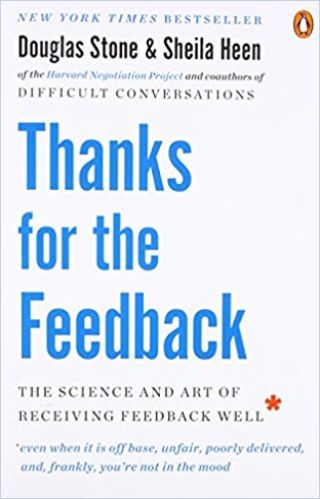Harvard Law lecturers and bestselling authors Douglas Stone and Sheila Heen detail – with compassion and wit – why it’s so hard to hear or accept advice.

Accepting Feedback
Feedback is a regular part of every relationship, yet it’s often fraught with problems. In this illuminating guide, Harvard Law School lecturers and bestselling authors Douglas Stone and Sheila Heen explain why most people fail to hear or understand feedback. Drawing from current psychological research and years of consulting, the authors uncover how people subconsciously distort the meaning of even the gentlest coaching. They provide concise, actionable advice for combating your tendencies to dismiss needed feedback or to cave in if you get a negative evaluation. They offer steps you can take to become a better recipient of feedback – and a better feedback giver, too.
The bugle blast of evaluation can drown out the quieter melodies of coaching and appreciation.Douglas Stone and Sheila Heen
The authors’ broad approach may limit the utility of their advice for those seeking an organizational framework for feedback, but their guidance is valuable on a person-to-person level at work or anywhere else.
Three Distinct Forms
Feedback takes three forms: evaluation, coaching and appreciation. A performance review is an evaluation telling you where you stand in the office or how you match up against a set of standards. Coaching is guidance. Your spouse, for example, may coach you, providing feedback to help you improve yourself and your marriage. Paying attention to your children shows your appreciation, and provides motivational feedback that acknowledges their accomplishments. Most feedback conversations combine all three, but the authors make it clear that each of the three elements is a distinct kind of input.
The ability to receive feedback well is not an inborn trait but a skill that can be cultivated. It may be fraught, but it can be taught.Douglas Stone and Sheila Heen
Your emotional reaction to feedback may drown out your coach’s message, which he or she is offering in order to help you. If you hear your boss’s attempts to coach as an evaluation, you’re distorting his or her message. When employees crave appreciation, giving them coaching instead only confirms their perception that you undervalue them. Separate your conversations for the purpose of evaluation, coaching and appreciation, and be forthright about which kind of conversation you are initiating.
Triggers
People – and the authors showcase their compassion and humanity by including themselves – receive negative feedback poorly and are even worse at giving it. Triggers distort how you receive feedback when it clashes with your view of yourself or the situation.
Trying to ignore a triggered reaction without first identifying its cause is like dealing with a fire by disconnecting the smoke alarm. Douglas Stone and Sheila Heen
The authors advise asking the feedback giver to be more specific and personal – not generic. Triggers to watch out for include “relationship triggers,” which generate distortions according to your relationship with your coach, and “identity triggers,” which amplify feedback’s negative implications.
Be aware that nonverbal communication can affect up to 40% of social outcomes. Focus on feedback that conveys information that is otherwise opaque to you and let it increase your awareness. Understanding feedback will illuminate your reasons for applying it or rejecting it. Being willing to say “no” is a crucial part of hearing feedback.
Issues of trust, credibility or a coach’s skill at giving feedback can override the substance of the message.
Receiving feedback well is a process of sorting and filtering – of learning how the other person sees things; of trying on ideas that at first seem a poor fit; of experimenting. Douglas Stone and Sheila Heen
The authors perceptively suggest stepping outside the conversation to single out the different issues under discussion. Address each matter separately, talking about each on its own terms, before the conversation spirals out of control.
Scrutinize Your Relationships
To perceive feedback clearly, analyze the relationship systems at play. Typically, people view the feedback they give as constructive criticism and interpret feedback from others as blame. People regard their behavior, even when it clashes with their beliefs, as stemming from their situation, but they attribute other people’s behavior to their personality or innate nature.
Listen for relationship issues lurking beneath coaching. Douglas Stone and Sheila Heen
Correcting this tendency requires considering how conflicting roles, organizational structures, timing and environment may be shaping your behavior. Such considerations will help you remove personal judgment from feedback.
Baseline Level
Neurological variations partially explain people’s varying responses to feedback, particularly negative information. Your baseline level of happiness – how far you swing in the face of negative or positive feedback and how long the swing lasts – is innate and stems from genetics.
But we know we can’t just tra-la-la down the road of life ignoring what others have to say, safely sealed in our emotional Ziploc.Douglas Stone and Sheila heen
People with a high happiness baseline and short swings respond well to feedback. Those with low baselines and longer swings react negatively. Half of your response to feedback springs from how you interpret it, and that is in your control. Prepare for feedback by considering how you typically react and imagining for the worst-case scenario. Imagine how you would advise a friend who received the same feedback. Stone and Heen suggest adopting the perspective of a third-party observer.
Growth
Responding to feedback well requires cultivating a growth-based identity that allows you to accept feedback as a way to improve.
The authors remind you that organizational systems of feedback are always imperfect because they depend on the relationship between supervisors and staff members. Instead, try to establish a transparent feedback system open to employee input, separate the three types of feedback and base any evaluations on clear, consistent criteria.
Our perception of feedback is inevitably influenced (and sometimes tainted) by who is giving it to us.Douglas Stone and Sheila Heen
Coach your staff members and express your appreciation of them year-round. Team leaders should model feedback by soliciting it themselves, sharing stories of learning from their mistakes and emphasizing positive behaviors.
Humane and Witty
Stone and Heen walk a tightrope – they present academic, anecdotal and research-based evidence with equal emphasis and a constant awareness of the power of people’s blindness to their own cognitive processes – and the authors confess that they, too, suffer this blindness.
The key variable in your growth is not your teacher or your supervisor. It’s you. Douglas Stone and Sheila Heen
Their compassion gives their work great value as an applicable, useful read for anyone seeking new avenues for personal and professional development and for those trying to develop an unthreatened, productive appreciation for feedback – whether from your mom, spouse or boss. Given that asset, this practical, surprisingly amusing guide is for anyone navigating a mentoring or coaching relationship, and for anyone receiving or delivering feedback.
Douglas Stone and Sheila Heen also co-wrote the New York Times bestseller Difficult Conversations with Bruce Patton. Stone co-authored Real College: The Essential Guide to Student Life with Elizabeth Tippett.













